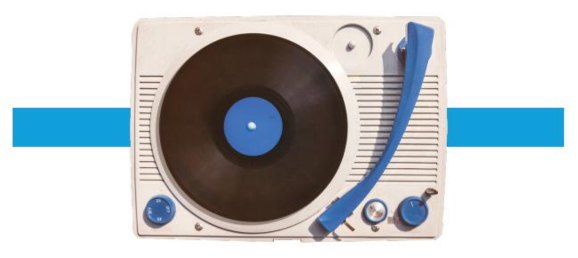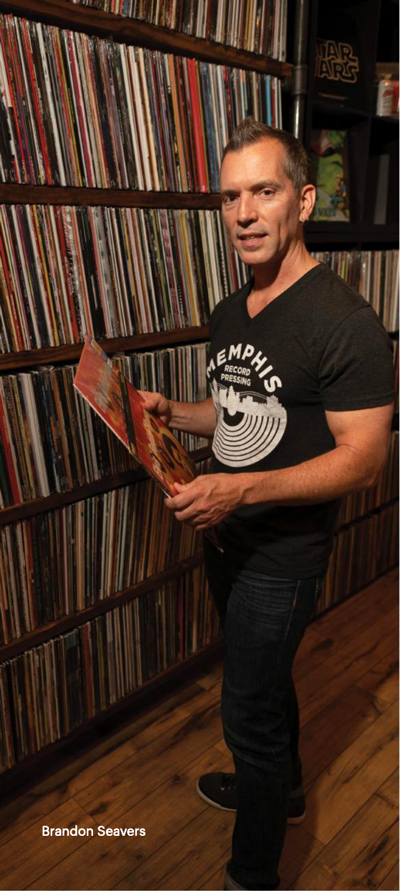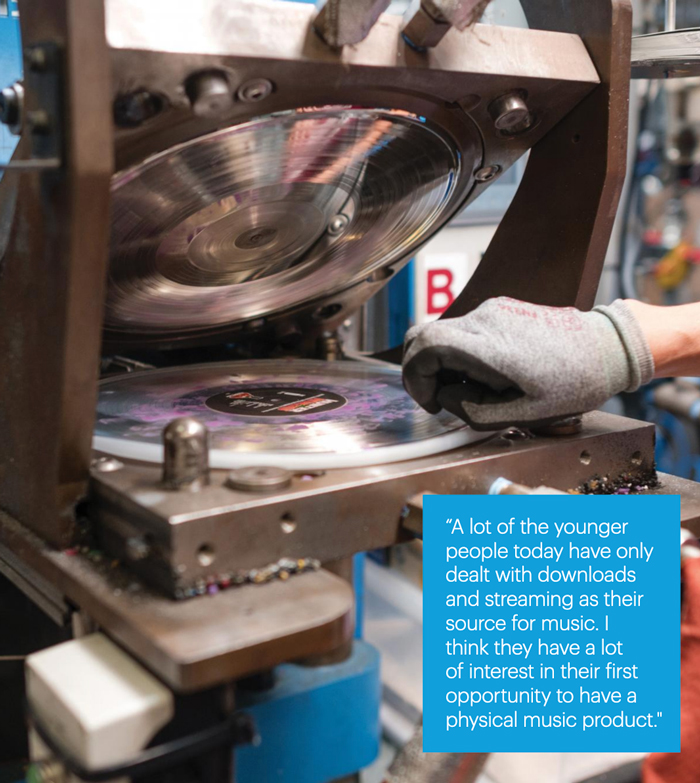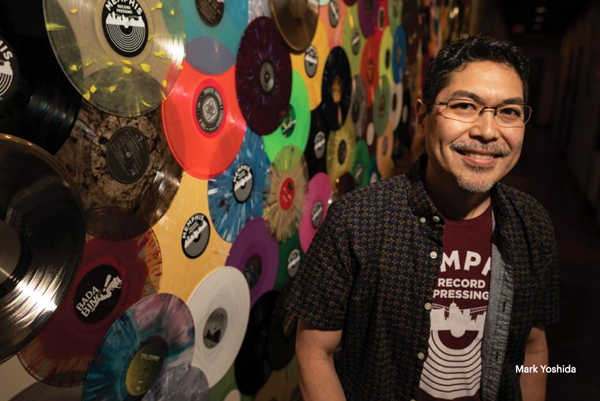UofM Magazine

The beginning of the end for the production of vinyl records seemingly occurred in 1982 with the invention of the compact disc. The emergence of digital downloads and streaming following the turn of the century should have put the finishing touches on the vinyl manufacturing industry.
Yet, in the first half of 2021, vinyl record sales were up by more than 100%, continuing a run of consecutive growth over the past 15 years.
The vinyl revival is booming business for University of Memphis graduates Brandon Seavers and Mark Yoshida, co-founders of Memphis Record Pressing. Founded in 2014, the company is now the second-largest manufacturer of vinyl records in North America. Memphis Record Pressing ranked in the top half of Inc. 5000’s fastest-growing companies list in 2020 and recently received the Bartlett Chamber of Commerce Entrepreneur(s) of the Year Award.
“The demand right now is far exceeding our capacity,” Seavers said. “If we could triple our production tomorrow, we could still sell every single record. That’s the current strength of the vinyl industry.”

UofM Connection
 The relationship Yoshida and Seavers have built into a thriving business started at
then-Memphis State University in the early 1990s.
The relationship Yoshida and Seavers have built into a thriving business started at
then-Memphis State University in the early 1990s.
Yoshida, a Michigan native, transferred from the University of Michigan to Memphis State in 1986 after being drawn to the Recording Technology program. He founded his first business, Rockingchair Recording Studios, as a senior in 1989, and met his longtime business partner a couple of years after graduating.
“When I was a student at the University, Mark came and spoke to one of my classes about his studio,” said Seavers, a lifelong Memphian who graduated from Memphis State in 1994. “I just approached him after class and expressed my interest in becoming an intern or getting a start in the business however I could. Now, here we are, having worked together in some capacity for close to 30 years.”
As the need to reserve recording space dwindled in the mid-90s, Yoshida closed his studio in 1997 and partnered with Seavers to create AudioGraphic Masterworks — a CD and DVD manufacturing company. Business remained strong until 2010, when digital downloads and streaming were beginning to plummet CD sales.
“By 2012, it was a real struggle,” Yoshida said. “We started wondering where we would turn next. It was like what had happened with the studio all over again.”
While clients of AudioGraphic Masterworks were showing a decreased need for CD production, they were expressing an increased interest in vinyl records as its resurgence was gaining traction. With familiar and trusted client Fat Possum Records, an independent record label based in Oxford, Miss., committed as a partner, Memphis Record Pressing was born.
“Because we understood the music industry and we knew how to be a manufacturer of a physical product, we started looking around for vinyl equipment,” Yoshida said. “At that time, we had no way of knowing where this was going. We just felt like no other option made sense.”
In With the Old
Memphis Record Pressing began producing its first vinyl records six months after acquiring a defunct pressing plant in the summer of 2014. A partnership formed two years later with Czech Republic-based GZ Media, the largest manufacturer of vinyl records in the world, and took business to new heights.
The company had 15 employees and pressed an estimated 180,000 records in 2015. That grew to 180 employees by mid-2021 with an expected 7 million records manufactured by the end of the year. Memphis Record Pressing has partnered with many of the top record labels, including Sony, Universal, Warner and Concord.
To meet the demand, work rarely stops at 3015 Brother Blvd. in Bartlett, Tennessee. Employee shifts typically run consecutively 24 hours a day, five days a week.
 “When people learned we were opening a plant, our phones didn’t stop ringing because
there was such a backlog,” Seavers said. “Literally, for a year, they rang every single
day with people begging us to make vinyl. In the beginning, we had so much to learn
but the demand provided the incentive. Eventually, we got to where we are now with
plans to keep growing.”
“When people learned we were opening a plant, our phones didn’t stop ringing because
there was such a backlog,” Seavers said. “Literally, for a year, they rang every single
day with people begging us to make vinyl. In the beginning, we had so much to learn
but the demand provided the incentive. Eventually, we got to where we are now with
plans to keep growing.”
Collectability has been a contributing factor in the increased interest in vinyl records. Some consumers value the rarest vintage copies while others want to build an expansive collection of old and new music.
What comes as somewhat of a surprise to many, though, is the younger generations fueling this resurgence. According to research from Statista, U.S. consumers in 2018-19 aged 25-34 were just as likely to buy vinyl records as those aged 55 and older. The 18-24 age group accounted for 15% of all sales over that same period.
“A lot of the younger people today have only dealt with downloads and streaming as their source for music,” Yoshida said. “I think they have a lot of interest in their first opportunity to have a physical music product. Vinyl has appeal as a much better product in that way than a CD.
“Vinyl is also an experience. You have to be in a room with a turntable. It makes you slow down, and you can’t jump easily between songs. That was a completely new experience to a lot of people that are buying vinyl records now and helping push the comeback of the industry.”
Fad or Future?
It is difficult, if not impossible, to say when the comeback of vinyl records might reach its peak.
“We never thought of trying to be as big as we are now,” Yoshida said. “I guess that is also what makes it hard to say what is next because we are still pleasantly surprised with where we are.”
It is a certainty, though, that demand is still much higher than the capacity to produce. That remains true even with recent shifts in the industry making vinyl records easier to make and more accessible to consumers.
 When Memphis Record Pressing began in 2014, the only way to manufacture vinyl records
was with used, well-worn presses. Today, suppliers are making new presses that are
far more advanced. Memphis Record Pressing has replaced all of its older presses with
the newer automatic press machines purchased from its partner, GZ Media, over the
past three years. This advancement in technology has allowed the company to manufacture
a projected 7 million vinyl records in 2021, up from 4 million the previous year.
When Memphis Record Pressing began in 2014, the only way to manufacture vinyl records
was with used, well-worn presses. Today, suppliers are making new presses that are
far more advanced. Memphis Record Pressing has replaced all of its older presses with
the newer automatic press machines purchased from its partner, GZ Media, over the
past three years. This advancement in technology has allowed the company to manufacture
a projected 7 million vinyl records in 2021, up from 4 million the previous year.
Customers don’t have to look hard to find vinyl records anymore, either, with major retailers such as Walmart and Target stretching the potential consumer base fully into the mainstream. Walmart even hosted its first online “Vinyl Mania Week” last spring to take advantage of the hype.
As the craze shows no signs of slowing, neither is Memphis Record Pressing. The company announced plans last summer to quadruple production over the next two years. The increased capacity includes building a new facility next to its two existing spaces and moving packaging to a separate location. This will help meet the demands of its backlogged business, which, as of June, was booked well into 2022.
“The plan, as it stands now, has us projected to be the largest manufacturer of vinyl records in North America and one of the largest in the world,” Seavers said.
And it all started from a chance meeting on the University of Memphis campus.
